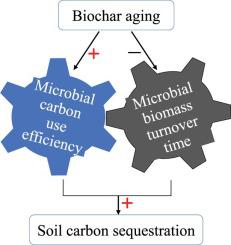Our official English website, www.x-mol.net, welcomes your
feedback! (Note: you will need to create a separate account there.)
Biochar aging increased microbial carbon use efficiency but decreased biomass turnover time
Geoderma ( IF 5.6 ) Pub Date : 2021-01-01 , DOI: 10.1016/j.geoderma.2020.114710 Junmin Pei , Jinquan Li , Shamim Mia , Balwant Singh , Jihua Wu , Feike A. Dijkstra
Geoderma ( IF 5.6 ) Pub Date : 2021-01-01 , DOI: 10.1016/j.geoderma.2020.114710 Junmin Pei , Jinquan Li , Shamim Mia , Balwant Singh , Jihua Wu , Feike A. Dijkstra

|
Abstract Biochar amendment causes immediate increases in soil organic carbon (SOC), but long-term effects are unclear. Biochar properties change with time (biochar aging) potentially affecting how efficiently SOC remains in soil after decomposition, indicated by microbial carbon use efficiency (CUE, the ratio of microbial growth over carbon uptake). Effects of fresh and aged biochar amendments on microbial CUE and biomass turnover time (BTT) were determined using the H218O-DNA incorporation method. Biochar aging increased CUE (control vs. fresh vs. aged of 0.6 vs. 0.6 vs. 0.7) but decreased BTT (51 vs. 37 vs. 27 days) due to changes in soil pH. Moreover, a greater CUE but shorter BTT was found in the sandy-textured Tenosol compared to the clayey Dermosol, possibly due to protection by clay minerals. Biochar aging and associated increase in soil pH may promote soil biogenic carbon sequestration through increasing microbial CUE or decreasing BTT.
中文翻译:

生物炭老化提高了微生物碳的利用效率,但减少了生物质周转时间
摘要 生物炭改良剂会立即增加土壤有机碳 (SOC),但长期影响尚不清楚。生物炭特性随时间变化(生物炭老化),这可能会影响 SOC 在分解后保留在土壤中的效率,由微生物碳利用效率(CUE,微生物生长与碳吸收的比率)表示。使用 H218O-DNA 掺入方法确定新鲜和陈年生物炭改良剂对微生物 CUE 和生物量周转时间 (BTT) 的影响。由于土壤 pH 值的变化,生物炭老化增加了 CUE(对照、新鲜、老化 0.6 天、0.6 天和 0.7 天),但 BTT 降低(51 天、37 天和 27 天)。此外,与粘土质的 Dermosol 相比,在沙质质地的 Tenosol 中发现了更大的 CUE 和更短的 BTT,这可能是由于粘土矿物的保护。
更新日期:2021-01-01
中文翻译:

生物炭老化提高了微生物碳的利用效率,但减少了生物质周转时间
摘要 生物炭改良剂会立即增加土壤有机碳 (SOC),但长期影响尚不清楚。生物炭特性随时间变化(生物炭老化),这可能会影响 SOC 在分解后保留在土壤中的效率,由微生物碳利用效率(CUE,微生物生长与碳吸收的比率)表示。使用 H218O-DNA 掺入方法确定新鲜和陈年生物炭改良剂对微生物 CUE 和生物量周转时间 (BTT) 的影响。由于土壤 pH 值的变化,生物炭老化增加了 CUE(对照、新鲜、老化 0.6 天、0.6 天和 0.7 天),但 BTT 降低(51 天、37 天和 27 天)。此外,与粘土质的 Dermosol 相比,在沙质质地的 Tenosol 中发现了更大的 CUE 和更短的 BTT,这可能是由于粘土矿物的保护。











































 京公网安备 11010802027423号
京公网安备 11010802027423号